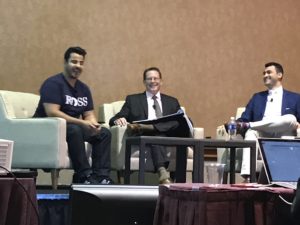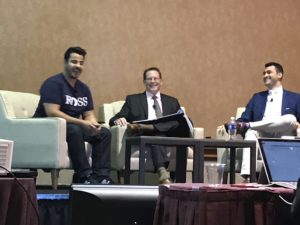I am attending the session Myths, Realities and Future of AI + Automation in the Law, live at ILTACon 2017. The International Legal Technology Association annual conference is the preeminent global legal tech conference.
The moderator is Andrew Arruda (CEO, ROSS Intelligence) and the panelists are Samuel Whitman (KM Leader, Mayer Brown) and Martin Tully (Co-Chair, Data Law Practice Akerman).

As with all my live blog posts, I publish as a session ends. So please forgive any typos or errors in my understanding of what speakers say.
What is AI? Andrew says it’s almost impossible to define. Generally, it’s teaching a machine system something that humans do. Components of AI include machine learning, natural lanaguage processing (NLP), vision, and speech. AI is not necessarily new: the foundations of the work started in th 1920s. Cites a more current example, the move the The Imitation Game, about Alan Turing in the 1950s.
So why the sudden surge in interest? Three factors
- Need computing power, which we now have.
- Digital information for training. With advent of Internet, we have digitized much content.
- Maturation of algorithms. With computing power and data, you can work with it.
If you feed AI enough data, it can come up with hypotheses about inputs that relate to that data. That’s machine learning. NLP is about understanding unstructured text (human writing). Vision is understanding how the outside world works. Uses example of Facebook recognition of images for tagging. Speech recognition is understanding the spoken work (speech to text, for example Amazon Alexa).
What Excites You About AI Today? Martin points out several prior hot topic: cloud and Big Data. On the one hand, people use AI in the daily role. For example, Spotify to recommend songs, contextualized to person, place, and time or shopping recommendation systems. But many consumers don’t recognize these as AI systems. So today, AI eliminates tedious steps, freeing people to focus on higher value tasks. Martin likens AI to the prep cook for the chef.
Sam’s view is that as soon as we use AI, it’s not longer AI. When calculators replaced slide rules, that could have been viewed as AI (relative to what came before). AI is a technology that has not yet been invented.
What’s the State of AI in Law? Martin favors the term augmented human intelligence:
- Today, we have rule-based expert systems to deliver legal advice. Cites an Akerman tool for data breach notification across multiple states. Turbotax is a legal expert system for a very complex body of law. These tools work 24×7
- Large scale predictive systems for document review in discovery (“TAR” or tech-assisted review) or in contract due diligence.
- Machine learning and deep learning that enhance knowledge and explain data.
Sam cites expert systems, for example, classifying a worker as an employee or contractor. Also, extracting clauses from contracts in due diligence. Mayer Brown uses a tool to digest 50 similar contracts to assess structure and clauses across them to derive a standard. (RF: this is presumably KM Standards product at work.)
Martin: AI in legal is met with fear, disbelief, or irrational exuberance. All three reactions make no sense. Analogizes to advent of computer-assisted legal research (CALR) first enabled by Lexis. You have to take a realistic point of view on any new technology to understand what they do. Likens AI to what Am Jur or CJS (Corpus Jursi Secondum) did in the print days – serve as a starting point but enable lawyers to add value. [Don’t make same mistake many partners did in the 1990s saying email is a passing fad.]
Martin: AI is more like Jarvis helping Tony Stark (Ironman) than SkyNet (Terminator) wiping out humans.
Sam: lawyers don’t like doing high volume work. They’d rather have the computer do the first pass of work. Use computers and AI to enable higher value, more interesting work. Martin adds that law firms should use tech / AI as a recruiting tool – make the work of new lawyers more interesting. That would attract candidates.
Andrew makes the point of AI extending what lawyers can do, for example, provide more access to justice (A2). AI can enable lawyers to serve more people, meeting unmet demand.
What is Coming Next for the Use of Legal AI and Big Data in Law? Sam: I want not only more but better data. For example, use AI to assess and analyze costs in similar types of matter. Understand what drives cost difference.
Martin: “A dire prediction”. Cites a tech leader who predicts that most people will get automated legal advice. Martin disagrees. We will still need lawyers, they just will do different work. Jobs don’t go away, they change. Martin asks if legal chatbots engage in unauthorized practice of law (UPL). Akerman stands behind its expert system advice. Is there an equivalent for chatbots; is what they even do the practice of law.
On the flip side, says Martin, is the ethical duty of technical competence. It might be malpractice not to use tool to improve quality and reduce cost.
Are You Guilty of Irrational Exuberance? Martin: we will see different categories of law firms. The tech-enabled ones will advance. A second group will take a wait and see attitude but will eventually be forced to. The third group will end up in the dustbin of history.
Sam: If I’m not, who will be? Who will look into and tech on the new technologies? We don’t know yet how big a game changer AI will be. But we must pay attention to it. Furthermore, if we don’t push forward, we risk being disrupted.
Martin: AI and automation can blow away compensation structures. We move to a world where value is not longer times rates? Firms have to grapple with new comp and economic models.
What Worked to Further AI in Your Organization? Sam: Things don’t just work out of the box. It takes system training – and adoption planning and training the lawyers. You have to educate lawyers and keep tweaking AI. It can take a long time to get there.
Martin: It takes a lot of time. And time is money. Demonstrating this to skeptics can be a challenge. But it can also be a big success – clients appreciate the better delivery. It can bring lawyers to a new level of being a trusted advisor.
Q&A – not blogged.
Session Description
Artificial Intelligence (AI) and other cognitive technology tools are appearing more frequently in the legal space, often with much fanfare. But how is AI being used to leverage data, automate legal work, reduce costs and enhance efficiencies? Participate in this robust discussion to examine what legal AI is, what AI technology can deliver today, how AI is transforming the legal profession and what the future may hold for legal AI and the automation of legal advice.
This is part 1 of 3 leading-edge sessions on AI.

Archives
Blog Categories
- Alternative Legal Provider (44)
- Artificial Intelligence (AI) (57)
- Bar Regulation (13)
- Best Practices (39)
- Big Data and Data Science (14)
- Blockchain (10)
- Bloomberg Biz of Law Summit – Live (6)
- Business Intelligence (21)
- Contract Management (21)
- Cool Legal Conferences (13)
- COVID-19 (11)
- Design (5)
- Do Less Law (40)
- eDiscovery and Litigation Support (165)
- Experience Management (12)
- Extranets (11)
- General (194)
- Innovation and Change Management (188)
- Interesting Technology (105)
- Knowledge Management (229)
- Law Department Management (20)
- Law Departments / Client Service (120)
- Law Factory v. Bet the Farm (30)
- Law Firm Service Delivery (128)
- Law Firm Staffing (27)
- Law Libraries (6)
- Legal market survey featured (6)
- Legal Process Improvement (27)
- Legal Project Management (26)
- Legal Secretaries – Their Future (17)
- Legal Tech Start-Ups (18)
- Litigation Finance (5)
- Low Cost Law Firm Centers (22)
- Management and Technology (179)
- Notices re this Blog (10)
- Online Legal Services (64)
- Outsourcing (141)
- Personal Productivity (40)
- Roundup (58)
- Structure of Legal Business (2)
- Supplier News (13)
- Visual Intelligence (14)

